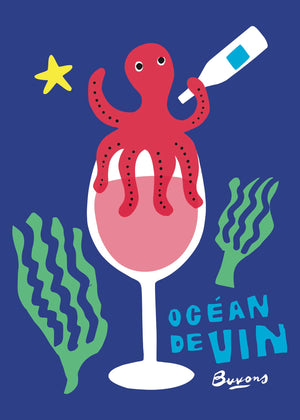
Grapes: Sauvignon Blanc
Region: Sancerre, Loire, France
Vintage: 2022
Viticulture: La lutte raisonnée
Soils: Clay + Limestone + Kimmeridgian marl
Vinification: Stainless steel
Aging: In foudre for 1 year, after 1 year the wine is racked in stainless tank and ages for an additional 6 months before bottling
Fining or Filtering: None
Sulfur: Minimal added
Notes from the Importer: Daniel Chotard and his wife, Brigitte, live just outside Sancerre in the village of Reigny. The Chotard family has been making wine for well over two hundred years, though Daniel was initially reluctant to accept the family vocation and started as a teacher. Daniel is a bit of a Renaissance man. His enthusiasm and passion for learning extends beyond wine and into music; he is a gifted guitarist and accordion player. He organizes lively music and wine soirées that showcase wine as an equally compelling art form to jazz. He has also invited Kermit to bring his rootsy band to perform in Sancerre—stay tuned for concert dates!
In recent years, Daniel has passed the reins of the domaine on to his son Simon. The terroir of Sancerre is widely regarded as producing one of the greatest expressions of the Sauvignon Blanc grape. Sancerre was once more celebrated for its red wine, a Parisian bistro favorite. Simon grows Pinot Noir as well, used to make both red wine and rosé. The hilltop town of Sancerre is surrounded by a commune of villages that collectively make up its eponymous appellation, and each village is blessed with varieties of a distinct limestone that imbues a lengthy mineral component to its wines. He farms the slopes of the village Crézancy-en-Sancerre, where flint meets clay and the famous Kimmeridgian limestone. Simon practices sustainable farming, and uses organic composts to treat the vines. Typically, he harvests his grapes later than his neighbors, resulting in full-bodied wines with a rich complexity. He has also transitioned away from using cultured yeasts, fermenting every wine naturally—a rare feat in an appellation where technical winemaking is still the norm. Simon’s quest for a more authentic expression of terroir has led him to isolate certain parcels on the basis of soil, experimenting with different aging vessels in the cellar (demi-muids, acacia, foudres...) to find the best match. Like his father’s music, Simon’s wines are luscious and complex with deep notes and long, satisfying finales.






